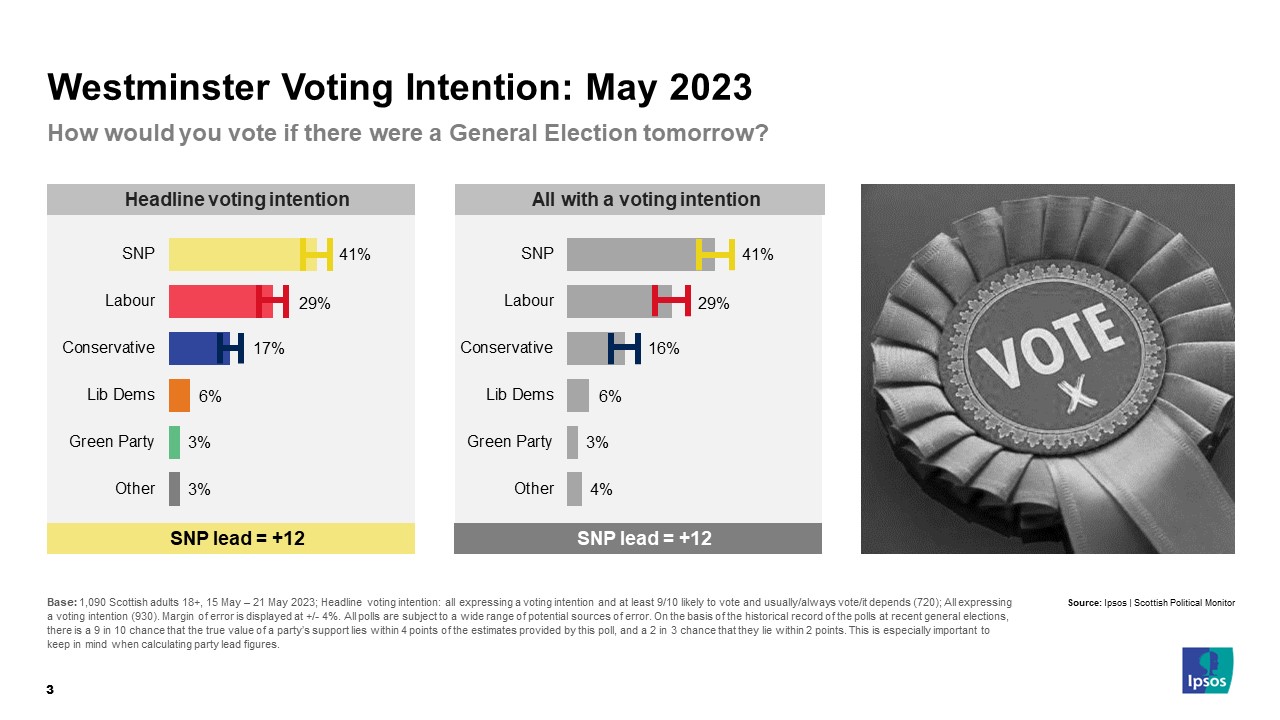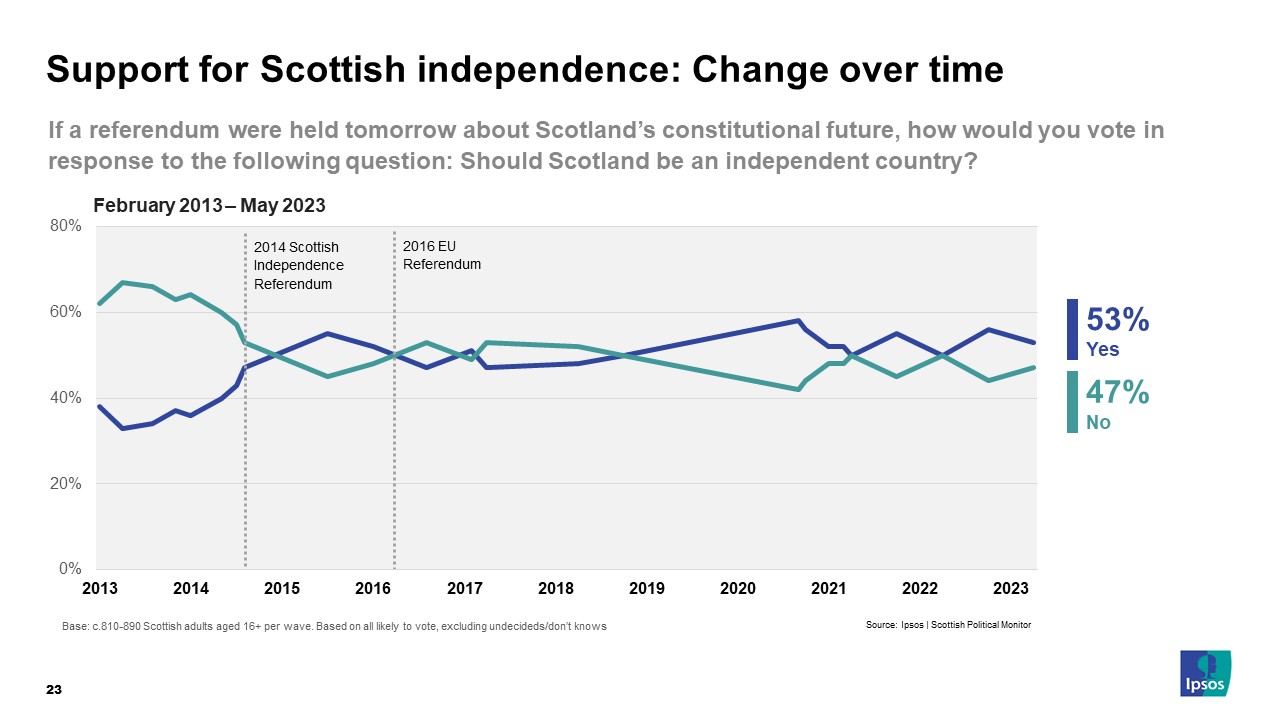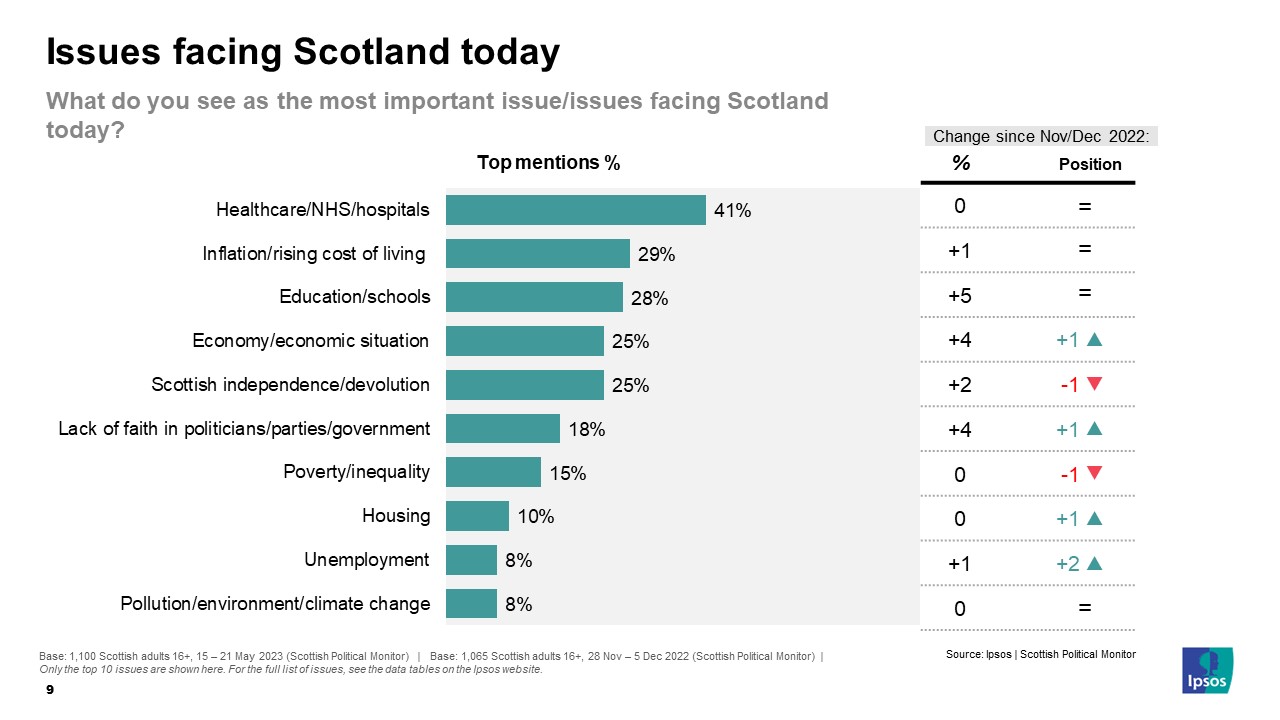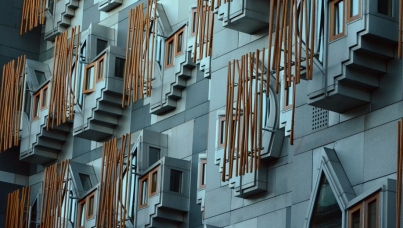SNP lead falls as Sarwar leads Yousaf in public satisfaction ratings
Key Findings
Ipsos’ Scottish Political Monitor, run in partnership with STV News, finds that:
- The SNP remains the dominant party in Scotland, although their support for a Westminster General Election has fallen by 10 points since December to 41%.
- Labour has increased its support lately and remains in second place, on 29% of the vote.
- There are signs that more 2014 Yes voters are beginning to consider voting for parties other than the SNP. The close relationship in recent years between past support for independence and support for the SNP may be weakening.
- Support for Scottish independence has also dipped since our last poll in December 2022, although by a smaller margin of 3 points. Our poll nonetheless finds a small lead for Yes: among those with a voting intention and very likely to vote, 53% say they would vote Yes in an immediate referendum while 47% say they would vote No.
General Election voting intention
While the SNP remains clearly ahead in voting intentions, support for the party has slipped by 10 percentage points over the past six months. At 41%, the proportion of likely voters who say they would vote for them in an immediate General Election is 4 points lower than the 45% who voted for them at the last General Election in December 2019.
Support for both Labour and the Conservatives has increased slightly compared with Ipsos’ previous poll in December 2022. Labour are in second place on 29% (10 points higher than the 19% of the vote they achieved in 2019), while the Conservatives are in third place on 17% (which, while a small improvement since last December, is still 8 points down on the 25% share of the vote they took in 2019).
Headline UK General Election voting intention figures for Scotland are:
- SNP: 41% (-10 compared with December 2022 Ipsos poll)
- Scottish Labour: 29% (+4)
- Scottish Conservatives: 17% (+4)
- Scottish Liberal Democrats: 6% (unchanged)
- Scottish Green Party: 3% (unchanged)
- Other: 3% (unchanged)

There are signs that some 2014 Yes voters may be increasingly willing to consider voting for other parties rather than the SNP at the next General Election. In recent years, support for independence has been very closely correlated with electoral support for the SNP. While still strong, this appears to be weakening slightly: our poll finds that while 69% of 2014 Yes voters say they would vote for the SNP at an immediate General Election, this is a fall of 12 percentage points compared with a year ago. Labour may be well placed to benefit: their support among 2014 Yes voters has increased by 9 percentage points compared with a year ago, to 15%.
Scottish Independence
- The poll shows a small lead for Yes. Among those likely to vote either Yes or No in an immediate referendum, 53% say they would vote Yes and 47% No. Yes support is down 3 percentage points compared with our previous poll in December 2022.

Top issues facing Scotland today
The top five key issues concerning for the Scottish public are:
- Healthcare/ the NHS (41% mention this as an important issue facing Scotland, unchanged since December 2022)
- Inflation/ the rising cost of living (29% mention this as an important issue facing Scotland, similar to the 28% who mentioned it in December 2022)
- Education and schools (28%, up 5 percentage points since December)
- The economy (25%, up 4 percentage points since December)
- Scottish independence/devolution (25%, up 2 percentage points since December).

Trust in parties
Although support for the party has slipped, the Scottish National Party remains more trusted by the Scottish public than either the Scottish Conservative Party or the Scottish Labour Party to deal effectively with a range of issues facing Scotland. The SNP is most trusted to stand up for Scotland’s interests (46%), manage education and schools and grow Scotland’s economy (both 36%), manage the NHS (34%) and tackle the cost of living crisis (31%).
In the wake of ongoing controversy about the party’s funding and finances, a quarter (26%) of the Scottish public say they trust the SNP most to act with honesty and integrity, while 18% say they trust Labour most to act in this way and 9% trust the Conservatives most. However, a further quarter (26%) say that they do not trust any of the parties to act with honesty and integrity.
The gap in public trust between the SNP and Labour is narrowest when it comes to tackling the cost of living crisis (31% trust the SNP most to do this, while 24% trust Labour most) and managing the NHS in Scotland (34% trust the SNP most to do this, while 25% trust Labour most). It is widest for standing up for Scotland’s interests: 46% say they trust the SNP most to do this, while 18% say they trust Labour most.
Leader satisfaction
- Anas Sarwar is the only political leader asked about in our poll to receive a positive net satisfaction rating – 40% are satisfied with his performance as Scottish Labour leader, while 33% are dissatisfied. However, 27% don’t know enough to rate him.
- Humza Yousaf’s ratings are more negative – 35% are satisfied with his performance as First Minister, while 44% are dissatisfied, giving a net satisfaction rating of -9. This contrasts with the +9 positive rating for his predecessor Nicola Sturgeon in our December 2022 poll.
- Scottish Conservative leader Douglas Ross receives a negative net satisfaction rating of -25 which, while low, is an improvement on his previous rating of -38 last December.
- In contrast, dissatisfaction with Rishi Sunak has increased compared with six months ago. He receives a negative net satisfaction rating from Scots, of -29, with 29% satisfied and 58% dissatisfied with his performance as Prime Minister.
- Dissatisfaction with Keir Starmer remains at a similar level to December 2022 – 34% are satisfied with his performance as leader of the UK Labour Party, while 47% are dissatisfied, giving a net satisfaction rating of -12 now compared with -13 in December.
Views on the Scottish Government’s legal challenge of the UK Government blocking the Gender Recognition Reform Bill
Half of Scots (51%) say that the Scottish Government should not be going to court to challenge the UK Government’s decision to block the Gender Recognition Reform Bill, while 39% say it should be doing so.
A majority (57%) of those who voted SNP at the 2021 Holyrood election think that the Scottish Government should be challenging the UK Government’s decision in court. However, the divisiveness of this issue for the SNP’s own voters is underlined by the finding that a significant minority - 36% - of SNP voters say that the Scottish Government should not be going to court to challenge the UK Government’s decision.
Emily Gray, Managing Director of Ipsos in Scotland, commented:
In the wake of Nicola Sturgeon’s unexpected resignation, a divisive leadership contest and controversy over the party’s funding and finances, support for the SNP has fallen back. With First Minister Humza Yousaf’s approval ratings weaker than Nicola Sturgeon’s were, it may be challenging for the party to regain that support. Meanwhile, Labour will be hoping that the indication in this poll of a weakening relationship between past independence support and voting for the SNP becomes a trend on which they can capitalise.
Technical Note
- Ipsos interviewed a representative sample of 1,100 adults aged 16+ across Scotland.
- Interviews were conducted by telephone from 15 – 21 May 2023.
- Data are weighted to the profile of the population.
- Where results do not sum to 100%, this may be due to computer rounding, multiple responses, or the exclusion of “don’t know” categories.
- All polls are subject to a wide range of potential sources of error. On the basis of the historical record of the polls at recent general elections, there is a 9 in 10 chance that the true value of a party’s support lies within 4 points of the estimates provided by this poll, and a 2 in 3 chance that they lie within 2 points. This is especially important to keep in mind when calculating party lead figures.



